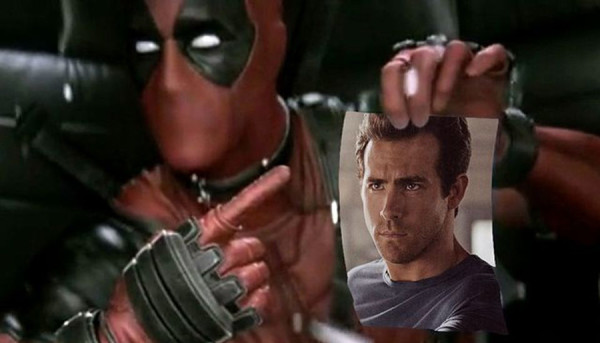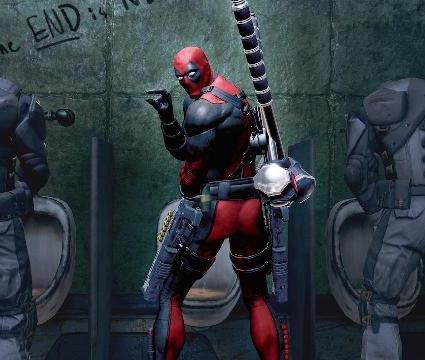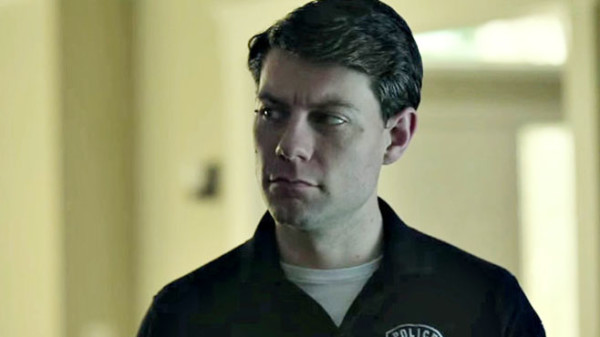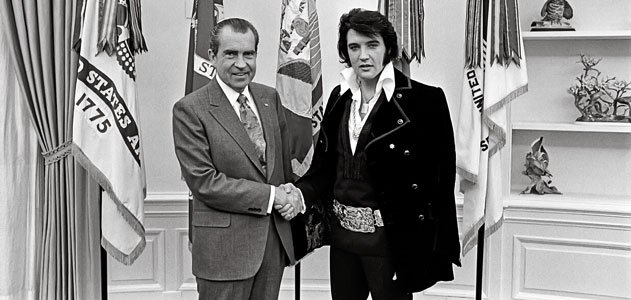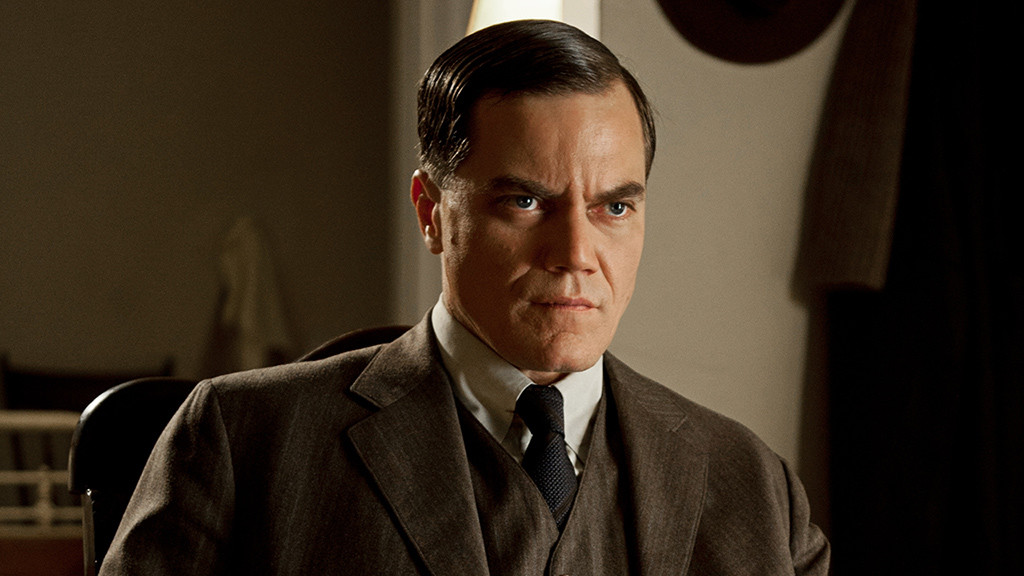Yesterday I pulled a Forest Gump. I went out for a quick jog and then just… kept going. And going and going. Until I ended up at some place called Tito’s Tapas. I met a young lady there named Margo and we spent the next three hours discussing Euler’s Equation. We came to the conclusion that the answer was 12. I then hitched a ride back home in a shared-ride Uber that ran out of gas in West Hollywood. So I bought an Astro Burger, took the bus home, and promptly fell asleep for the next five hours. Which is why I don’t have a fresh review for you today. Instead, I’ll share with you a review from my newsletter (sign up here!). Hope you enjoy!
Genre: Comic-Book/Action
Premise: After an evil gangster tortures and maims an innocent man, that man turns into a fast-talking psychotic superhero who will stop at nothing to get his revenge.
About: Hollywood works in mysterious ways. Rhett Reese and Paul Wernick lit the world on fire with their unexpected hit, Zombieland. All of a sudden, everyone associated with that film was the hottest thing in town. But after an ill-advised trip into the G.I. Joe franchise and a failed attempt at turning Zombieland into a TV show, Reese and Wernick found themselves right back where they started: desperate for Hollywood’s attention. Here’s where things get funny. After Zombieland, Reese and Wernick wrote Deadpool, an off-beat superhero script that quickly became one of the most beloved scripts in Hollywood. But writing something everyone loves and writing something that a studio wants to plunk down 150 million dollars for are two different things, and after doing some test footage, 20th Century Fox deemed the material too off-kilter, effectively killing the project. Then, five years later, that test footage leaked online and quickly became persona geek grata, with thousands of online chants that all said the same thing: “Why the hell aren’t they making this movie???” In the five years since the script was written, super-hero films had become the prom king of genres. And it just so happened, studios were now looking for new angles into the genre (remember what I was talking about yesterday? Angles!). Dare I say they were looking for superhero movies that were a little… off-kilter. So Fox grabbed box office mysterioso Ryan Reynolds to play the lead and Deadpool was off to the races.
Writers: Rhett Reese and Paul Wernick
Details: 112 pages (April 12, 2010 draft)
I’d always been curious about this screenplay because whenever the topic of “best unmade screenplays” came up, Deadpool was mentioned.
Now the history of “best unmade screenplays” is a funny one. Before Scriptshadow, there were about 30 scripts over the last 30 years that you’d always hear were “the best unmade screenplays in Hollywood.” These scripts had taken on an almost mythical status, and I was desperate to get my hands on them.
But what I quickly found was that the scripts weren’t all that good. They had a good scene here and some interesting ideas there, but as entire screenplays, you could clearly see why they were never made.
Like that famous script, The Tourist. That screenplay was an idea-machine but it read like a B-movie version of a bad David Lynch film. It just wasn’t good at all. And I realized that a lot of these scripts were propped up by the mere fact that no one could read them.
It’s like hearing about those playground basketball legends from the 70s. In 1979, Bats Jackson scored 55 points in one game. Ten years later, people recall that it was 75 points. By 2015, he’d scored 130 points and performed a triple back flip slam dunk and rode off on a triceratops.
Point being, it’s a lot harder to write a “best unproduced script in Hollywood” these days. Too many people have access to the scripts and therefore, can sniff out the bullshit.
Deadpool was one of the few scripts that seemed to survive this internet-age scrutiny. So I wanted to see how it fared.
Wade Wilson is an angry dude. And he has a right to be. He has to wear a suit and mask wherever he goes because he’s been burned, maimed, and mutilated to the point where even catching him in your peripheral vision would send you vomiting into the nearest storm drain.
We meet Wade (as his alter-ego, Deadpool) slamming into a car going after some guy named Francis, a local bigshot gangster who’s just been released from prison after ten years. As Deadpool tells us (in his ongoing voice over), he’s been waiting for this day forever. Finally, he gets to do to Francis what Francis did to him.
What did Francis do to him? Well, many years ago Francis chained him into his own little personal torture bay, and constructed a series of machines designed to torture Wade as much as a person can possibly be tortured without dying. Remember the Pit of Despair in The Princess Bride. It’s like that times a billion.
Francis even created the perfect torture device. A water tank that would drown Wade, but then, as soon as Wade was about to pass out, pump oxygen into him to keep him conscious, so he could go right back to drowning again, until the point where Wade was about to go unconscious, where he would pump more oxygen into him again, repeating that process for… OVER A YEAR.
So when we jump back to the present and Wade learns things like he’s been diagnosed with cancer, you understand why he’s not that phased. This man has been through way way worse.
The script essentially uses a parallel timeline structure where we follow Wade in the present as he goes after Francis and then cuts back to the past, where we see Francis enslaving Wade. We also see how Wade met the love of his life (Vanessa the hooker) and eventually transformed into his alter ego, Deadpool. Will Deadpool finally get Francis? The script’s online in plenty of places if you want to find out.
So why is this script so admired? Well, it’s got a lot of geek-friendly things going for it. The story itself is actually very simple. This isn’t Avengers where superheroes are trying to save the world. This is a revenge story. A guy wants to kill the guy who maimed him.
But it’s the way the story is told and the flash in its delivery that makes it stand out. Reese and Wernick knew if they told this simplistic story linearly, it would induce mass sleepage. Much better to introduce a mystery in the present (why does Deadpool want to kill this dude so badly??) and dole out hints to said mystery throughout the flashbacks.
The script is also very self-aware. Wade plays with an action figure of himself from one of the Wolverine movies, is absolutely infatuated with Hugh Jackman, collects Deadpool comic books, and at one point, even watches the first act of his own movie (yes, this movie) in his apartment.
The script is ruthless in its violence (note the drowning torture device I mentioned earlier), has an ongoing commentary track in the form of Wade’s comedic voice over, and does things that you just don’t see in superhero movies. For instance, we get a hardcore fucking scene with a superhero.
And then there are things that are just… weird. And that’s good. Like I always say, you have to take some chances with your screenplay. If you’re playing it straight down the middle, expect to see a lot of bored faces staring back at you.
Here we have Deadpool sawing his arm off in one scene and then that same arm growing back later. What?? Deadpool also casually hangs out with Colossus, an 8-foot tall man made out of pure steel. Which would seem normal in a superhero movie except for the fact that everybody else in this story is a flesh and blood person.
Couple all this with some balls-to-the-wall action starring a superhero who uses katana blades to dismember evil villains, and you get the kind of thing that 16 year-olds like to brag that they snuck into. It basically checks all the boxes on the geek checklist.
And yet…
Something was missing. I think all these devices are fun but if there isn’t an authentic core to the movie, if all it is is a bunch of wackiness, then how do you connect to it? How do you care? That’s what I kept waiting for. To care.
There’s something to be said for being relatable. If an audience relates to a character or his situation or his problems or his flaws, they’re much more likely to care what happens to him. Deadpool’s issues were so unique to his particular predicament (being tortured for no reason) that even though the man was dished out some extreme injustice, I didn’t really care if he succeeded in his revenge or not.
And also, the scope of the story bothered me. I don’t know if I’ve been conditioned in superhero movies to expect a goal with some actual consequences, but the fact that Deadpool ONLY wanted to get this one little tiny bad guy made this all feel so small. I didn’t feel like the story mattered enough.
I can admire this screenplay but it’s so jokey, so meta, so focused on the external rather than the internal, that that’s all I could do, is admire it. I never felt it. And that’s what kept this from being great. Still, this is worth the read just for how nuts it is.
[ ] what the hell did I just read?
[ ] wasn’t for me
[x] worth the read
[ ] impressive
[ ] genius
What I learned: If you have a really really simple story, like here, a man trying to enact revenge, consider infusing an offbeat structure into your screenplay. Offbeat structures can KILL a complex storyline (you don’t want to make something that’s complex even more complex). But for simple plots, they’re perfect. Here, we jump back and forth between the past and the present, using the flashbacks to inform the audience on how we got to this point of our hero wanting to kill our villain.
Genre: TV Pilot – Horror
Premise: A small town is plagued with a growing number of demonic possessions. The town outcast, who was shunned after claiming to battle these forces as a child, may now be the only one who can stop them.
About: This show comes from Walking Dead creator Robert Kirkman. Kirkman, looking to expand his empire, has brought his newest pilot to Cinemax, where it has quickly been picked up to series. The show will star Patrick Fugit, a name many of you may have forgotten. Fugit famously played Cameron Crowe’s version of himself in his film, Almost Famous. One of the nice things about this never-ending TV renaissance is that actors who may have been forgotten forever are being given another chance.
Writer: Robert Kirkman (based on the comic created by himself and Paul Azaceta)
Details: 70 pages (6/29/14 draft)
I don’t know what’s going on here, but something doesn’t feel right. Robert Kirkman has an amazing relationship with AMC. With Fear The Walking Dead arriving soon, he’ll have two hit shows on the prestigious network, making him, probably, the network’s biggest star.
So why, then, did AMC not pick up Kirkman’s Outcast? The guy should’ve been able to pitch it in his underwear while dribbling jello onto his belly and AMC fall over themselves to put it on the air. But that’s not what happened. It was sent off to Cinemax, a channel 70% of Americans believe no longer exists.
The only positive scenario I can imagine here is that so many people wanted the next Kirkman show that Cinemax, in a desperate bid to become relevant, overpaid – gave Kirkman a deal AMC couldn’t match. That’s what I’m hoping for, anyway, since that version of the story means I’m about to read a far better script. And with that, I slide into one of my more anticipated pilot reads in awhile.
Outcast begins with one hell of a disturbing teaser. An 8 year-old boy, Joshua, watches as a cockroach skitters up his bedroom wall. Seemingly in a trance, he SLAMS his head into the bug out of nowhere, smearing the roach into two pieces and then, for good measure, eating those pieces (with the bug still wiggling its last bit of life). Joshua, we’ll soon learn, is possessed by a demon.
Cut across town to Kyle Barnes, who lives in a Hoarders-stricken home that he leaves about as frequently as Rob Kardashian. We find out why that is when his sister, Megan, forces him to join her for some errands. Once out in public, everyone who sees poor Kyle looks at him like he’s the Devil.
Throughout the course of the pilot, we learn that Kyle did something horrible to his wife, who’s since taken their little girl and moved away. That wasn’t Kyle’s first strike either. He also beat up him mom when he was a kid. This guy’s got some issues. Or does he? Might there be something more going on here?
When Kyle hears about Joshua being possessed, he goes to his only ally in town, the gambling drinking Reverend Anderson. Anderson knows that Kyle has a gift – a gift to battle the demons inside of others. And so he brings Kyle to Joshua in the hopes of performing an exorcism.
But when Joshua starts talking directly to Kyle, telling him things about his life Joshua couldn’t possibly know, Kyle realizes that these possessions – with his mother, with his wife, with his child – have never been random. They’re targeted. Demons have been possessing the people closest to Kyle for years, trying to get to him. But why? And what is it that they ultimately plan to do to Kyle?
I’m going to tell you what I liked about this pilot. It’s a character piece through and through. And that’s what a pilot needs to be. It needs to be about characters having deep-set issues that date back years. We need this because we’re about to spend years with these characters ourselves and if their issues (with themselves, with each other) aren’t extensive, then there isn’t a whole lot to explore now is there?
I recently watched the pilot for Showtime’s show, Ray Donovan. You can feel a 9.5 Richter Scale-sized earthquake of conflict between Ray and his father, when the two meet for the first time after his dad is released from prison. There’s just so much pain and anger and history there that you want to stick around to see where it all comes from.
With Kyle we have this whole backstory with his mother, who used to beat the hell out of him. We also have something with his sister, who he apparently saved as a child but who now he doesn’t get along with. We have a history between him and his wife (and daughter) that needs to be resolved. We have an entire town who hates him because of this supposedly terrible thing that he did. Those are a lot of character relationships that need to be fixed!
And I liked how Kirkman set that all up. He didn’t just come out and say, “This is what happened to Kyle!” We meet Kyle in the midst of his recluse lifestyle. We see brief flashbacks of his mom locking him in the pantry. We see him try to alienate his sister. We see the way the townspeople feel about him. But we aren’t given straight answers as to how any of this connects. It makes us want to read on! We want to find out what he did that was so horrible (we eventually find out that he either hit his kid or his wife – but not, of course, for the reasons the townspeople think).
So what didn’t I like about the pilot? That it was a character piece through and through. The character stuff is so heavy here, it starts to get overbearing towards the end. If you thought Rick from The Walking Dead was a downer, Kyle’s got him beat by a country mile. This dude’s had a rough life and he’s not afraid to mope about it!
I don’t know. After awhile it was just like, “We get it. Your life sucks.” However, you could make the same argument about all The Walking Dead characters. A lot of them are acting the exact same way today as they did four seasons ago. I actually stopped watching last season because of that. I was like, “Haven’t we seen all of this already?”
Kirkman has a tendency to slip into monodrama, and that’s why The Governor’s Walking Dead season was the best. It brought out all these new sides of the characters (their personality, their energy), and gave the show some variety for once. Reading Outcast, I’m already sensing they’re going to nix variety in favor of long faces and serious storylines.
With that said, I kind of love the concept here. As I’ve said before, with this new TV world emerging, there are all these subject matters that people only used to use for movies that can now be used for television. That’s exactly what they did with The Walking Dead. Zombies used to be exclusively a movie genre. They made it a TV one. Now they’re doing the same with possession/exorcism. I think that’s smart as hell.
I just wish Kirkman would’ve implied a bigger mythology, a bigger plot. I’m all for intimate settings and character driven material but this IS a genre show and therefore we should get a sense of the bigger picture. Right now the bigger picture seems restricted to this town, which isn’t too exciting. Do I really care if Uncle Billy John Bob gets possessed? Not really. But if I felt these possessions were threatening to spread to nearby towns, maybe even the city, now you’ve got my attention.
As it stands, I’ll watch an episode or two to see where this goes. It has me curious but not hooked. Which sucks cause I really wanted to be hooked!
[ ] what the hell did I just read?
[ ] wasn’t for me
[x] worth the read
[ ] impressive
[ ] genius
What I learned: I love the 1-2 punch Outcast uses to draw you in. One way to draw a reader in is to introduce a big problem. We get that when we find out Joshua (the little boy) is possessed. Another way to draw a reader in is to introduce a broken relationship. We get that when Kyle and his sister, Megan, get into a fight as soon as they run into each ther. So a perfect way to start a pilot is to introduce BOTH of these scenarios one after the other. Introduce your plot element (the problem) and then your character element (the broken relationship). If you do this well, you’ll have roped us in immediately.
Genre: Comedy (I think?)
Premise: At 6.30am on December 21st 1970, the King of Rock’n Roll showed up on the lawn of the White House to request a meeting with the most powerful man in the world, President Richard Nixon. He had a very urgent request: to be sworn in as an undercover Federal Agent at large.
About: Elvis and Nixon was acquired by Amazon at the Cannes Film Festival and will star stellar actors Kevin Spacey and Michael Shannon as Nixon and Elvis respectively. The script was written by Joey Sagal, Hanala Sagal, and, in his first screenwriting gig, actor Cary Elwes (presumably off the buzz of his book, “As You Wish.”). This is, indeed, a strange writing team. Joey Sagal is best known for acting in a bunch of cheesy movies (Not Another Celebrity Movie, Anna Nicole, Redline). He’s also played Elvis Presley a number of times in his career, making you wonder if he originally wrote this for himself? Wife Hanala purportedly has over 90 million Youtube viewers and, according to her IMDB page, seven other films in development. I have to admit, this isn’t your typical “hot young writer” scenario we usually see with a buzzed about movie. But hey, why can’t that be a good thing?
Writers: Joey Sagal, Hanala Sagal & Cary Elwes.
Details: 123 pages
I’m telling you right now, the cables and networks and theater chains better watch out. Because the entertainment world is changing faster than you can say Blockbuster Video. Internet giants Netflix and Amazon are digging into their Lord Of The Rings-sized caves of gold to disrupt the whole paradigm.
And while Amazon is putting Elvis and Nixon in theaters first, you get the feeling that the next Elvis and Nixon will be made exclusively for Amazon’s site. And once that happens, coupled with Netflix doing the same, expect a tsunami effect to follow. We’ll never look back.
A note to Amazon though if they expect to compete with Netflix. Rebrand your TV and movie arm. Every time I go to your site to watch a show or a movie, I have to navigate a weird chain of links to do so. It’s so annoying that I’ve found myself avoiding going back because I know how much of a chore it will be. With Netflix I just go to: NETFLIX. It’s pretty damn simple. Make your entertainment arm simple as well and watch the money start rolling in. You’re welcome. I only want an associate producer credit.
Well, the plot of this one pretty much goes how it says in the logline. Elvis is watching TV one night. He sees all the drugs and the flag burning and the Black Panthers and he decides that America has gone to shit.
So he enlists his buddy Jerry Schiller, the only true friend he has in the world, to head to Washington with him so he can meet President Richard Nixon and request to become a “Federal Agent At Large,” even though there’s no such thing – the idea being that he can then help clean up America or something.
Jerry’s tired of being Elvis’s bitch. Every time this happens he upends his life to help the King. Yet against everything telling him to say no, he says yes, and off they go. As soon as the two land, they head straight to the White House. Elvis has written a letter to Nixon detailing his need to become a Federal Agent at Large right away.
Unfortunately, the White House guards tell him that even though they love blue suede shoes, there’s not much they can blue suede do.
Luckily, word of Elvis’s wish meets two young White House aides who happen to be Elvis fans. They ask Nixon if he’ll meet Elvis but Nixon says he thinks the guy’s an idiot. So hell no.
They break the sad news to Jerry, who’s pissed for about five minutes before remembering that Nixon’s daughter is a fan. So he gets word to her that Elvis wants to meet her father, and the next thing Nixon knows, he’s a slave to the demands of his spawn.
The movie ends with the 20-minute long meeting, where a pissy Nixon gradually warms up to Elvis, realizing he’s a great guy who shares a lot of the same political views as the V-fingered figurehead. Nixon surprisingly requests a photo of the pair which would go on to become the single most requested photo from the National Archives in history.
I don’t think I’ve encountered anything this light and fluffy since tripping over my neighbor’s Pomeranian. That’s not necessarily a bad thing. But you’re kind of encouraged, when writing screenplays, to write something with weight, with actual stakes. And the whole time I was reading Elvis and Nixon, I kept asking myself “What are the stakes here?”
I realize that’s a very “Screenwriting Professor” thing to say, and that art shouldn’t be boxed into such restrictive ideologies. So let me put it another way. What happens if Elvis doesn’t get his meeting with Nixon? I’m pretty sure nothing in his life changes. For that reason, this trip, this goal, doesn’t matter. So it was hard to get emotionally invested in the movie.
I mean, the trip obviously matters to Elvis, who’s obsessed with meeting the president and getting this secret badge thing, and that accounts for something. Sometimes you can distract the audience from the low stakes of your story by making the matter so important to the hero that we simply don’t pay attention to the bigger picture.
The problem is, Elvis is painted as such a one-dimensional character here, it’s hard to care about him caring. The King is pretty much played as a joke throughout. Most of the time, he acts like a 12 year-old who wants the hot new cowboy costume for Halloween in order to impress all his friends at school.
He truly honestly wants this secret agent badge so he can infiltrate bad groups of people. Elvis Presley. Infiltrating people UNDER COVER. Which I suppose is funny, and the joke they’re going for, but it comes at the expense of taking your hero seriously. And I personally can’t stand when writers make a joke at the expense of character.
Which leaves “Elvis and Nixon” feeling like one giant curiosity. I spent most of the read trying to understand why such top-level talent would want to make this. And then it hit me. Elvis and Nixon are two of the most iconic caricatures in pop culture history. To get to play one of them must be a dream for an actor. You really get to have fun.
I guess my next question would then be, does Michael Shannon have fun? I’m pretty sure the last time the guy smiled was when he was 8, after watching a school bus full of children drive over a bridge. And this only brings up more questions. Like what is the tone going to be here? I’m guessing they’re going for FULL WEIRD – Charlie Kaufman style – as that’s the only way I can see them justifying this lightweight concept. If you play this straight there’s simply not enough meat on the bone.
In fact, I think this script could’ve been a lot better had it taken its protagonist more seriously. There are these hinted-at moments of Elvis’s complex childhood, as well as repeated mentions of the handlers who control his life. I would’ve liked to have seen his character arc around those issues. See him stand up for himself or something. Instead, we get a pseudo-airhead who believes he’s a secret agent, which just wasn’t meaty enough to justify a feature film in my opinion.
Not saying it won’t work for others. But this was too thin for me. Elvis in his 20’s thin.
[ ] what the hell did I just read?
[x] wasn’t for me
[ ] worth the read
[ ] impressive
[ ] genius
What I learned: Just say NO to your hero. A lot! — Throughout this script, Elvis keeps getting a “No,” in response to his desire to meet the president. But he keeps fighting and fighting until he finally gets his “Yes.” And really, that’s how every story should work. You give your protagonist a goal, and then you spend the majority of the screenplay saying “No” to him. But he keeps fighting and fighting until he finally gets his “Yes.”
No Amateur Offerings this week, sadly. Next Friday I’ll be reviewing last week’s Amateur Offerings winner, Sessions of Lead Belly. The consensus seems to be that the writing’s a bit raw but that the unique voice makes up for it. You can download and read it here.
In the meantime, remember that there are just 19 days left to enter the Scriptshadow Screenwriting Competition. Feel free to use today’s talkback to discuss box office this weekend (Minions and Self/Less – a script I reviewed a couple of years ago) and any loglines you want to try out. As you know, if something’s not working in logline form, it’s going to be tough to make work in movie form. So make sure that logline’s solid!

Just 20 days left, folks. The contest is FREE. Winner gets their script optioned by Grey Matter. There’s no better contest deal on the planet! Submit now!

